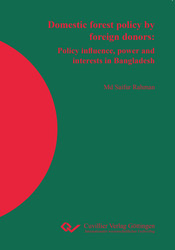| Departments | |
|---|---|
| Book Series (96) |
1381
|
| Nachhaltigkeit |
3
|
| Gesundheitswesen |
1
|
| Humanities |
2370
|
| Natural Sciences |
5408
|
| Mathematics | 229 |
| Informatics | 319 |
| Physics | 980 |
| Chemistry | 1364 |
| Geosciences | 131 |
| Human medicine | 243 |
| Stomatology | 10 |
| Veterinary medicine | 108 |
| Pharmacy | 147 |
| Biology | 835 |
| Biochemistry, molecular biology, gene technology | 121 |
| Biophysics | 25 |
| Domestic and nutritional science | 45 |
| Agricultural science | 1005 |
| Forest science | 201 |
| Horticultural science | 20 |
| Environmental research, ecology and landscape conservation | 148 |
| Engineering |
1795
|
| Common |
98
|
|
Leitlinien Unfallchirurgie
5. Auflage bestellen |
|
Advanced Search
Domestic forest policy by foreign donors (English shop)
Policy influence, power and interests in Bangladesh
Md Saifur Rahman (Author)Preview
Table of Contents, PDF (77 KB)
Extract, PDF (190 KB)
Following internationalisation, the influence of non-domestic actors on domestic policy processes has been rising, and diverse actors and institutions have started to extend their influence beyond state borders. The study attempts to analyse how do foreign donors influence domestic policy making process as well as gain power and serve interests employing Bangladeshi forest policies. The study established the idea that donor funding can have an impact on domestic policy changes. In its political process, specific donor (USAID) may build coalition with non-state actors at all level circumventing national bureaucracies to fulfill their desired political interests. They use prominent policy issues like forest biodiversity and climate change to gain particularly incentives and dominant information power capability. Furthermore, in allocating their development aid foreign donor organizations (USAID, GIZ and EU) simultaneously to their formal development-oriented interests, pursue informal political, economic and strategic self-interests.
| ISBN-13 (Hard Copy) | 9783736994737 |
| ISBN-13 (eBook) | 9783736984738 |
| Final Book Format | A5 |
| Language | English |
| Page Number | 232 |
| Lamination of Cover | glossy |
| Edition | 1. Aufl. |
| Publication Place | Göttingen |
| Place of Dissertation | Göttingen |
| Publication Date | 2017-02-10 |
| General Categorization | Dissertation |
| Departments |
Forest science
|
| Keywords | Development aid, foreign donor bureaucracies, power capability, national bureaucracies, formal and informal interests, forest policy, Bangladesh |








